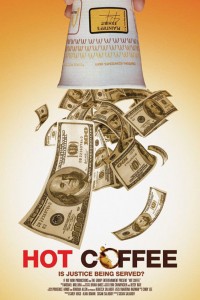This semester, the HumanDocs series has shed new light on the human struggle.
The fight for peace in Liberia.
The fight against negative portrayals of women in the media.
And now the fight over a steaming cup of coffee?
On Nov. 30, students gathered to watch “Hot Coffee,” a documentary about seemingly frivolous lawsuits.

The film takes its title from the case of Stella Liebeck v. McDonald’s, where an elderly woman sued the fast food giant for giving her a cup of coffee that was so hot it burned her.
The case was widely dismissed by the media as ridiculous, even being mocked by David Letterman and on the popular show “Seinfeld.” But this documentary explored Liebeck’s side of the story – the effect the lawsuit had on her family, the harsh treatment from the media and what really happened when she spilled that cup of coffee.
As soon as Lieback’s injuries from the spill were shown, the audience began to question just how frivolous her lawsuit was.
And the documentary didn’t stop there. Using the McDonald’s case as a springboard, the filmmakers told two other stories highlighting the issues with tort reform.
The case of Colin Gourley focused on medical malpractice. As a result of a doctor’s negligence, Colin Gourley was born with cerebral palsy; his twin brother Connor was not.
Though a Nebraska jury awarded the family more than $5 million to cover the cost of expenses, a state-mandated cap limited the funds to $1.2 million. Former Mississippi judge Oliver Diaz told the filmmakers how inside deals within the court system had failed the Gourley family.
The system also failed Jamie Leigh Jones, an administrative assistant working for military contractor KBR in Iraq. Jones said she was raped by her co-workers, but arbitration contracts hindered her ability to bring the case to trial.
The plaintiffs of these lawsuits are the focus of this documentary, likely because it’s directed by former plaintiff attorney, Susan Saladoff. As she expertly explains, when individuals take on corporations, their stories are often warped or twisted so they’ll be dismissed as frivolous. So while the documentary is one-sided, it’s a side that needs to be heard, and “Hot Coffee” provides its voice.

